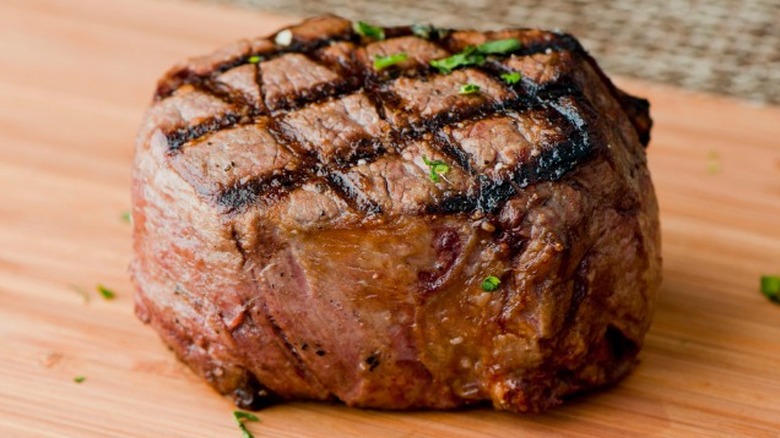Expert Pitmaster Explains The Difference Between Grilling Grass-Fed And Non-Grass-Fed Beef
Customers and carnivores are opting for grass-fed beef over conventional beef at a higher rate than in previous years, primarily for the health benefits and to curb their environmental impact, Meat+Poultry reported. Expert pit master Rodney Scott, of Rodney Scott's Whole Hog BBQ, explained that cows are considered grass fed if they're raised on a diet of grass and have space to roam in pastures. Conventionally-raised cows, on the other hand, eat corn or grains.
Grass-fed beef received a nod from WebMD for its health benefits, which the site noted generally surpasses the nutrition of conventional beef. It boasts five times higher levels of omega three fatty acids and fewer calories.
As far as the meat itself is concerned, the grass-fed option contains less fat and marbling, according to Scott. This subtracts tenderness, which the conventional alternative is known for, he added. Because of this difference, Scott noted, grass-fed beef needs a little bit more attention before it goes on the grill to achieve the best results.
Grass-fed beef needs added tenderness
As the grass-fed beef market continues to grow, per Meat+Poultry, there are nuances to be aware of before you fire up your grill. According to expert pit master Rodney Scott, if you opt the grass-fed option, be prepared to take a few moments to tenderize the meat with a mallet. That's because of the lower fat content of grass-fed beef versus conventional beef, which Scott noted contains more marbling than grass-fed beef, giving it innate tenderness.
For gilling, Scott said he prefers conventionally-raised beef for this reason. He noted that grass-fed beef is more flavorful and can develop a greater sear. But he added that nothing compares to the fat in conventional beef. Grass-fed beef lacks this quality because the cows' diets are leaner — mostly grass — and they have more space to move around. Thus, the cows don't accumulate as much fat on their bodies, which means grillers should tenderize this type of meat, a foolproof technique for tender steak every time.

